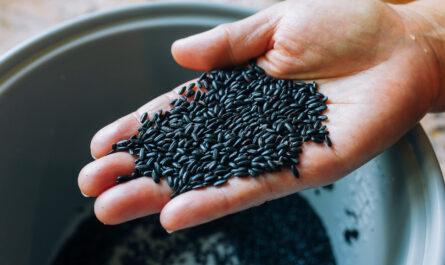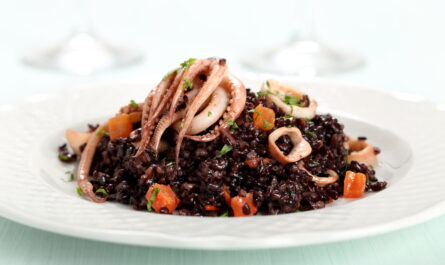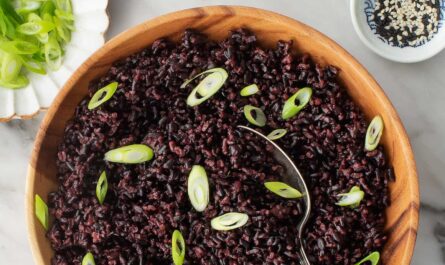In recent years, black rice has been increasingly recognized for its unique nutritional profile and potential health benefits. One of the key nutrients found in black rice is potassium, which is essential for maintaining several bodily functions. In this article, we will explore the connection between black rice and potassium, and why this duo should be part of your diet.

What is Black Rice?
Black rice, also known as forbidden rice, is a variety of rice that is rich in nutrients and antioxidants. It gets its dark purple-black color from anthocyanins, which are powerful antioxidants that can help protect against various diseases.
The Nutritional Profile of Black Rice
Black rice is not only rich in antioxidants but also packed with essential nutrients, including potassium, vitamin E, and fiber. These nutrients contribute to its numerous health benefits, making it a valuable addition to any diet.
Understanding Potassium
Potassium is a vital mineral that plays a crucial role in maintaining fluid balance, nerve function, and muscle contractions. A diet rich in potassium can help lower blood pressure, reduce the risk of stroke, and support overall heart health.
Why is Potassium Important?
Potassium is essential for several reasons. It helps regulate blood pressure, supports proper muscle and nerve function, and maintains fluid balance in the body. Consuming adequate amounts of potassium can also help prevent kidney stones and bone loss.
Health Benefits of Black Rice and Potassium
The combination of black rice and potassium offers numerous health benefits. Here are some of the key advantages of including black rice in your diet:
Improved Heart Health
Both black rice and potassium contribute to improved heart health. Potassium helps lower blood pressure, while the antioxidants in black rice protect against oxidative stress and inflammation, reducing the risk of heart disease.
Enhanced Digestive Health
The high fiber content in black rice promotes healthy digestion and prevents constipation. Potassium also supports proper muscle function in the digestive tract, ensuring smooth digestion.
Better Blood Sugar Control
Black rice has a low glycemic index, which means it releases sugar slowly into the bloodstream, helping to maintain stable blood sugar levels. Combined with potassium, it can help improve insulin sensitivity and reduce the risk of type 2 diabetes.
How to Include Black Rice in Your Diet
Incorporating black rice into your diet is easy and can enhance the nutritional value of your meals. Here are some delicious ways to enjoy black rice:
In Sushi
Black rice adds a unique flavor and color to sushi, making it a popular choice among sushi lovers. Try using black rice in sushi rolls for a nutritious twist.
As a Side Dish
Cook black rice as a side dish to complement your favorite proteins and vegetables. Its nutty flavor pairs well with a variety of dishes.
In Salads
Add cooked black rice to salads for a hearty and nutritious meal. Combine it with fresh vegetables, nuts, and a light dressing for a satisfying dish.
Black Rice vs. Brown Rice
While both black rice and brown rice are nutritious, black rice has a higher antioxidant content due to its anthocyanins. It also offers more iron and fiber compared to brown rice, making it a superior choice for those seeking additional health benefits.
Potential Risks and Considerations
While black rice is generally safe for most people, it is essential to consume it in moderation. Overconsumption of rice, in general, can lead to excessive calorie intake, which may contribute to weight gain. Additionally, some individuals may experience allergies or sensitivities to black rice. To learn more about potential allergies, visit black rice allergies.
Buying and Storing Black Rice
When purchasing black rice, look for high-quality options in health food stores or online. Store black rice in an airtight container in a cool, dry place to maintain its freshness and nutritional value.
Conclusion
The combination of black rice and potassium offers numerous health benefits that can enhance your overall well-being. By incorporating black rice into your diet, you can enjoy improved heart health, better digestion, and stable blood sugar levels. To further explore the benefits of black rice, visit WebMD.

FAQ
Is black rice suitable for a low-carb diet?
Black rice is higher in carbohydrates compared to other low-carb options. It is best consumed in moderation if you are following a low-carb diet.
Can I eat black rice raw?
Black rice should be cooked before consumption to ensure it is safe to eat. Learn more about eating black rice raw.
How does black rice affect digestion?
Black rice is high in fiber, which promotes healthy digestion and prevents constipation. For more on this topic, visit black rice and digestion.
This article contains affiliate links. We may earn a commission at no extra cost to you.




